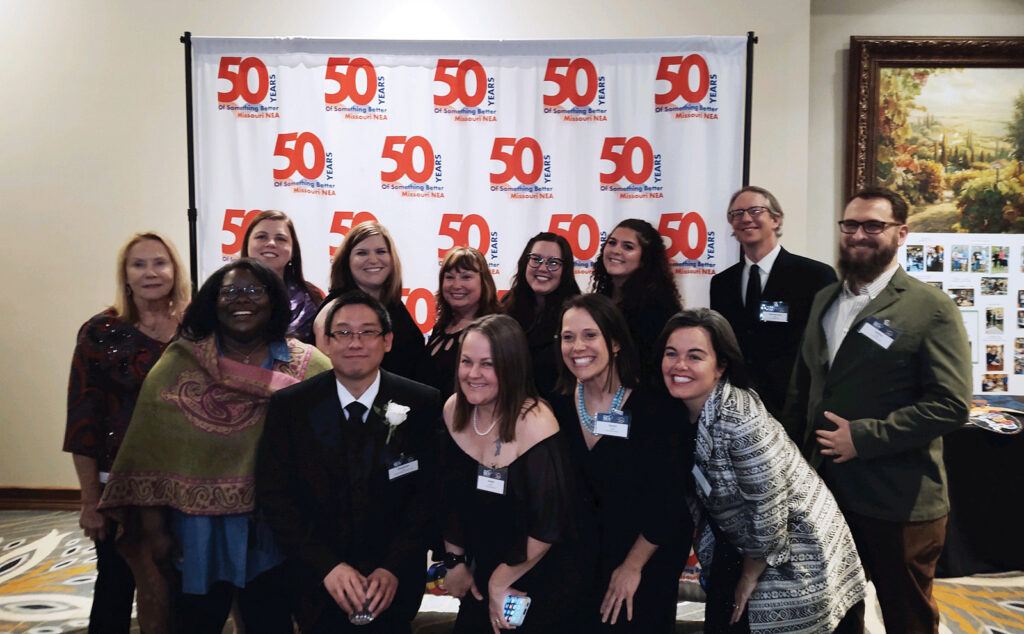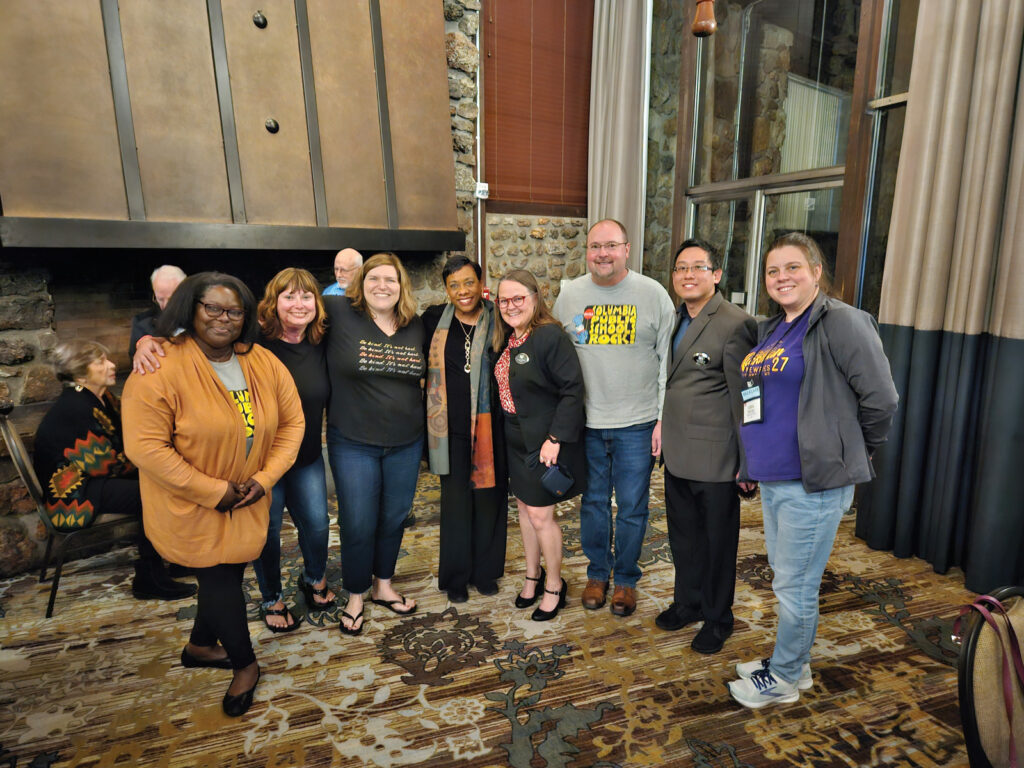CMNEA Says Students Benefit When Teachers Unite

The Columbia NEA is not an end in itself, but rather a means to one.
Unions have been making headlines. Starbucks employees are trying to form them. Hollywood writers and actors challenge studios, networks, and streaming services from the picket lines to come up with compensation and protection solutions in step with 21st century technology. And UPS drivers want, among other things, the company to provide air conditioning in their trucks now that climate change is evoking record-setting heat waves.
Technically, it takes only two employees to join forces to work collectively to further their interests. Wages and benefits, working conditions, and job enhancements are matters employees need to address with employers. Unions provide the collective power they need to negotiate from a position of strength.
You don’t have to look far to learn how unions are working to try and improve the lives of their members. The Columbia Missouri National Education Association (CMNEA) has been in the trenches for a while. And while the battles keep heating up, CMNEA says it is sticking up for students attending Columbia Public Schools (CPS) by sticking up for teachers.
By the Numbers
With three million members, the National Education Association (NEA) is the largest union in the United States. It has affiliate organizations in every state, including Missouri NEA (MNEA), plus 14,000 community-level affiliates, including CMNEA.
MNEA launched in 1973 and currently has roughly 32,000 members. CMNEA was one of Missouri’s first local organizations formed under the NEA and MNEA umbrellas. Some 700 CPS teachers are dues-paying members of the NEA. To put that into perspective, teachers are categorized by CPS as “certified staff.” During the 2022-23 school year, the school district’s full-time equivalent (FTE) for certified staff was 1,446.
Two of the most important numbers, though, may be years: 2007 and 2012.
In 2007, the Missouri Supreme Court upheld the constitutional right of public educators to bargain collectively with their employers in Independence NEA vs. Independence School District. In 2012, the high court essentially reversed 55 years of precedent, ruling that most public employers, including school boards, not only have an obligation to collectively bargain with unions but to do so in good faith.
Noelle Gilzow, president of CMNEA, says the 2012 case is probably the most significant recent event that impacted what the organization does.
“In union towns like Kansas City and St. Louis, collective bargaining has been around much longer,” Gilzow says. “But in smaller places in outstate Missouri, where unionism isn’t as prevalent an attitude, that decision allowed us to organize and bargain on behalf of CPS teachers.”
What that means, Gilzow explains, is that CMNEA could negotiate what provisions its membership wanted in their contracts and those provisions are then legally binding. Before that, the organization could talk to the CPS Board of Education about what its members wanted, but anything one board granted had no legal enforcement if the next board didn’t want to follow through.
“Our teachers are no longer subject to the whims of board policy which can change relatively quickly, depending on the composition of the district administration and the Board,” she says.
During the historic challenges that arose during the pandemic, membership in CMNEA grew. Teachers, Gilzow says, felt “heard” by the organization. And when they were dealing with unprecedented events, they needed a voice.

No Beating Around the Bush
Businesswoman Randi Zuckerberg (sister of “Meta” Mark) advises: “Never beat around the bush when you’re asking for a raise.” The leadership of CMNEA demonstrated its commitment to advocating for teachers when it negotiated a $650 increase in the base salary for CPS teachers earlier this year. There was no beating around the proverbial bush, although there was good, old-fashioned compromise.
In the beginning, the CPS board was offering a $200 base increase. CMNEA was asking that the $40,250 base be raised to $50,000. The board and union finally agreed to the $650 figure, but Gilzow wants to work with the district on strategic incremental raises to $50,000 over the next five years.
Compensation is always addressed, but it isn’t the only issue CMNEA has raised with the board. The organization considers everything that can improve teachers’ ability to teach, such as measures designed to ensure safety and security, leave, and preserve their mental health.
“Two years ago, we finally got it into the collective bargaining agreement that every teacher gets a 30-minute, duty-free lunch,” Gilzow says. “Especially with elementary teachers, where they’re taking kids to the lunchroom then having to pick them up, there were cases where they were getting less than 30 minutes. That’s pretty tough. Teachers need downtime to recollect themselves, get back in the zone, and get back at it.”
“We put a major focus on having teachers be the best that they can be so they can serve their students in the best possible way,” she says.
By Teachers, For Teachers
The leadership of CMNEA is volunteer-based. There’s no executive director on the payroll. Instead, there are teachers advocating for the interests and welfare of teachers. Gilzow, for example, is the science department chair at Hickman High School and teaches advanced placement biology, honors anatomy, and biology.
In addition to the president, the organization’s executive team comprises first and second vice presidents, secretary, treasurer, and chairs for membership, public relations, political action, and education support professional committees. The local organization receives guidance and support from the MNEA Unit 18 director as well.
Having someone active in CMNEA to talk to if you’re a teacher at any of the CPS schools is easy. There’s a CMNEA building representative in every facility. At last count, that’s 22 elementary schools, seven middle schools, and four high schools. Plus, there’s representation for the Career Center, Parents as Teachers Program, the Center for Early Learning – North, Gifted Education, and CORE.

Investing In Your Own Self-Interests
Union membership isn’t free. MNEA has a graduated dues schedule for years one through four so new members get a price break while learning the benefits of belonging to the organization. After four years, members pay full dues which are currently about $690 per year. But a new member would pay more like $280 a year. Dues are paid to MNEA which then pays the national organization a certain amount, based on Missouri’s total NEA membership. CMNEA then receives a percentage to spend on local activities.
CMNEA members can apply for grants or scholarships to further their education and professional development. They have access to professional liability insurance coverage, discounts at local businesses, and resources they need to maintain their professional certification and credentials.
College debt is a huge issue for teachers who earn their degrees and end up in a profession with far less lucrative paychecks than others. CMNEA has partnered with a local financial company that assists members with preparing applications for debt-relief programs.
CMNEA and MNEA also represent their members when they are confronted with disciplinary action or measures related to performance reviews. Gilzow says it’s important that the union doesn’t just help its members as a group, but also as individuals in the profession.
Part of the CMNEA budget gives back to teachers directly, during American Education Week and Teacher Appreciation Week. But members can also request funding through several different classroom grant opportunities. In 2022-23, Gilzow says CMNE funded 27 requests from members for activities of their own creation.
Support Teachers, Support Students
Gilzow believes that supporting teachers is the path to supporting students. And students – no matter who they are – need more and more support these days to succeed.
“We support teachers. We know that a teacher’s working environment is the student’s learning environment,” she adds. “So we do what we can to optimize that for the teacher because it benefits the student. We believe that every student deserves a great public education, no matter what their ZIP code is.”


